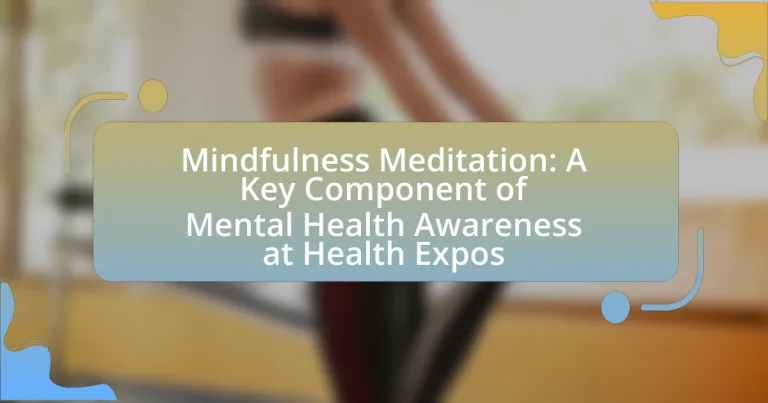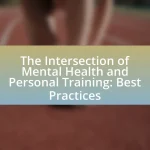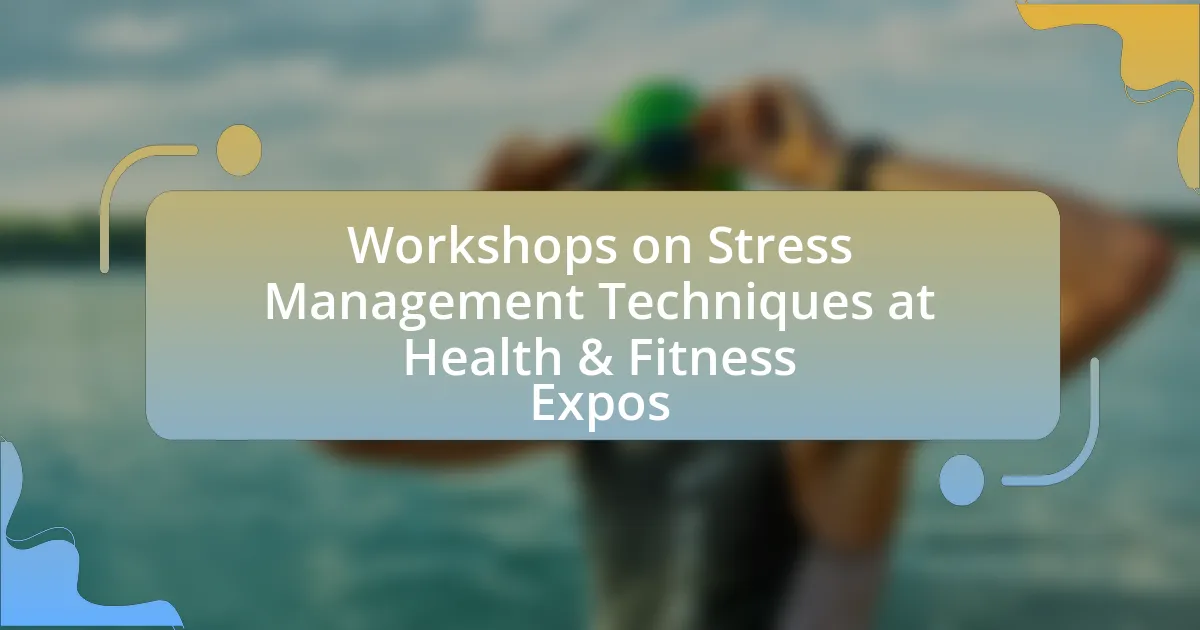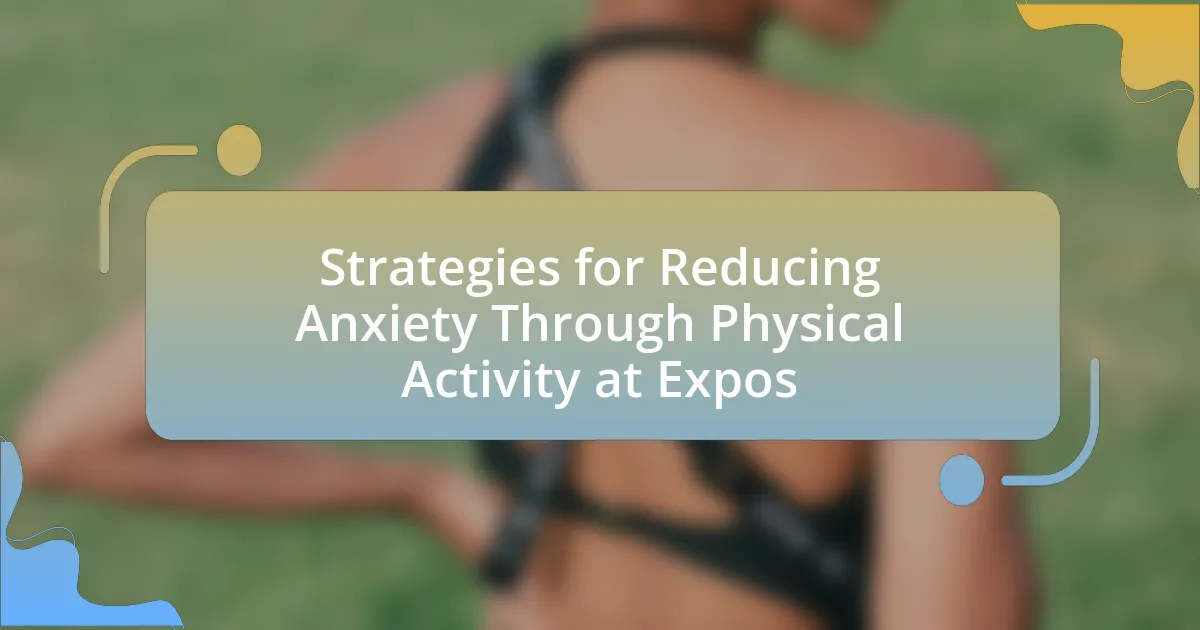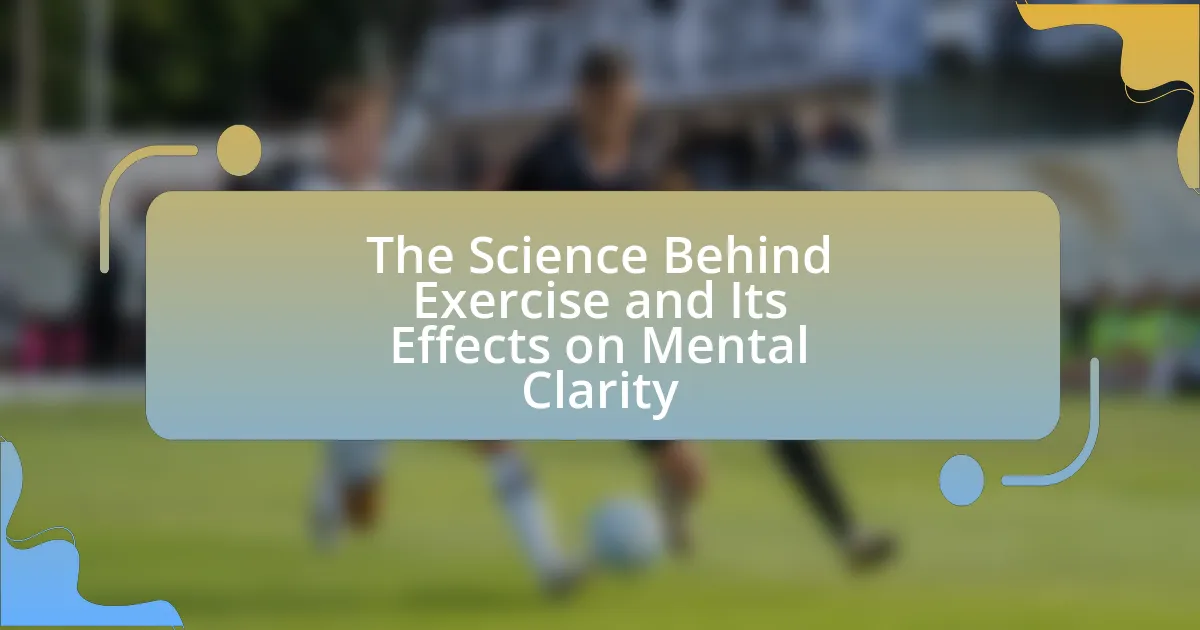Mindfulness meditation is a mental practice that emphasizes present-moment awareness and acceptance of thoughts and feelings without judgment, rooted in Buddhist traditions. This article explores the significance of mindfulness meditation in enhancing mental health awareness, particularly at health expos, where it serves as a vital tool for stress reduction and emotional regulation. Key principles of mindfulness meditation, its distinct techniques, and the scientific evidence supporting its effectiveness in improving mental health outcomes are discussed. Additionally, the article outlines strategies for integrating mindfulness practices into health expo activities and daily life, highlighting the importance of creating supportive environments for ongoing practice.
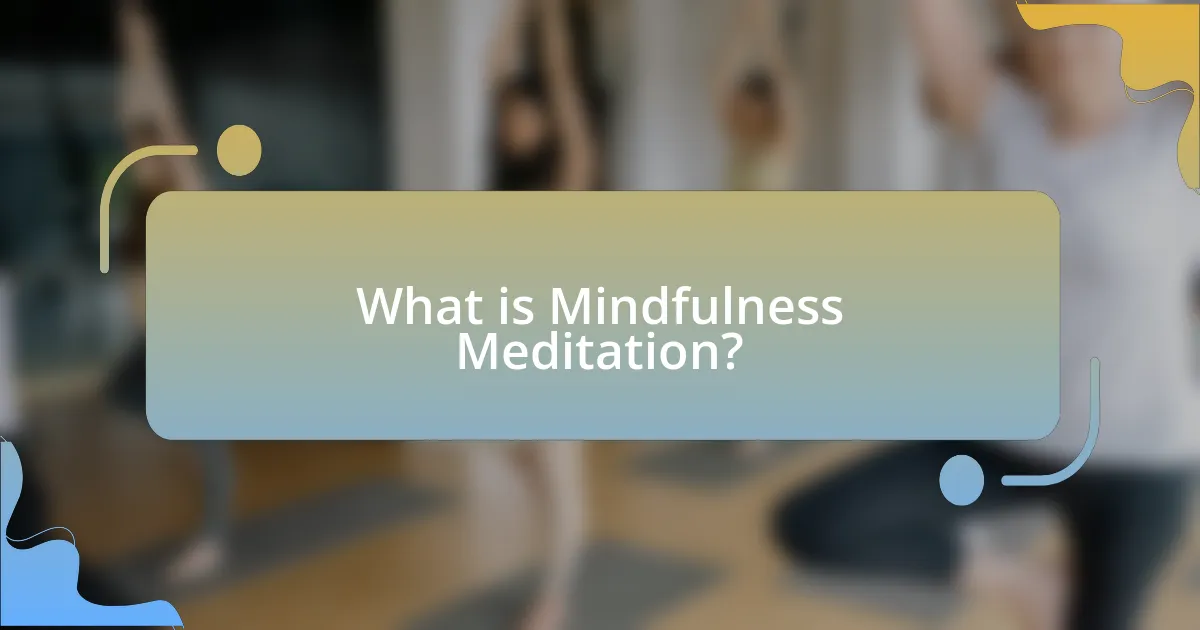
What is Mindfulness Meditation?
Mindfulness meditation is a mental practice that involves focusing attention on the present moment while acknowledging and accepting one’s thoughts, feelings, and bodily sensations without judgment. This technique has roots in Buddhist traditions and has been widely adopted in various therapeutic contexts, demonstrating effectiveness in reducing stress, anxiety, and depression. Research published in the journal “JAMA Internal Medicine” indicates that mindfulness meditation can lead to significant improvements in psychological well-being, highlighting its role in enhancing mental health awareness at health expos.
How does Mindfulness Meditation contribute to mental health awareness?
Mindfulness meditation enhances mental health awareness by promoting self-awareness and emotional regulation. This practice encourages individuals to observe their thoughts and feelings without judgment, leading to a better understanding of their mental states. Research indicates that mindfulness meditation can reduce symptoms of anxiety and depression, as evidenced by a meta-analysis published in JAMA Internal Medicine, which found that mindfulness meditation programs significantly improved mental health outcomes in participants. By fostering a greater awareness of mental health issues, mindfulness meditation serves as a vital tool in educating individuals about their mental well-being and the importance of seeking help when needed.
What are the fundamental principles of Mindfulness Meditation?
The fundamental principles of Mindfulness Meditation include awareness, non-judgment, and acceptance. Awareness involves focusing on the present moment, observing thoughts and feelings without distraction. Non-judgment means recognizing experiences without labeling them as good or bad, allowing for a more objective perspective. Acceptance entails embracing thoughts and emotions as they arise, fostering a sense of calm and reducing resistance. These principles are supported by research, such as a study published in the journal “Psychological Science,” which found that mindfulness practices can enhance emotional regulation and decrease anxiety.
How does Mindfulness Meditation differ from other forms of meditation?
Mindfulness meditation differs from other forms of meditation primarily in its focus on present-moment awareness without judgment. While many meditation practices, such as transcendental meditation or loving-kindness meditation, may involve specific techniques or mantras, mindfulness meditation emphasizes observing thoughts, feelings, and sensations as they arise, fostering a non-reactive awareness. Research indicates that mindfulness meditation can lead to significant reductions in stress and anxiety, as evidenced by a meta-analysis published in JAMA Internal Medicine, which found that mindfulness meditation programs can improve anxiety, depression, and pain. This distinct approach makes mindfulness meditation particularly effective for enhancing mental health and well-being.
Why is Mindfulness Meditation important at health expos?
Mindfulness meditation is important at health expos because it promotes mental well-being and stress reduction among attendees. Research indicates that mindfulness practices can decrease anxiety and improve emotional regulation, which is crucial in a high-stress environment like a health expo. For instance, a study published in the journal “Psychological Science” found that mindfulness meditation can enhance focus and reduce negative emotions, making it an effective tool for individuals seeking to improve their mental health. By incorporating mindfulness meditation into health expos, organizers can provide valuable resources that empower participants to manage stress and enhance their overall health awareness.
What role does Mindfulness Meditation play in promoting mental health?
Mindfulness meditation plays a significant role in promoting mental health by reducing symptoms of anxiety, depression, and stress. Research indicates that regular practice of mindfulness meditation can lead to measurable improvements in emotional regulation and overall psychological well-being. For instance, a meta-analysis published in JAMA Internal Medicine found that mindfulness meditation programs can significantly improve anxiety, depression, and pain, highlighting its effectiveness as a therapeutic intervention. Additionally, studies show that mindfulness meditation enhances self-awareness and promotes a greater sense of calm, which contributes to improved mental health outcomes.
How can Mindfulness Meditation be integrated into health expo activities?
Mindfulness meditation can be integrated into health expo activities through structured workshops, guided sessions, and interactive booths. These workshops can provide attendees with practical techniques for mindfulness, enhancing their mental well-being. Research indicates that mindfulness practices can reduce stress and improve emotional regulation, making them valuable for health promotion at expos. For example, a study published in the Journal of Health Psychology found that participants who engaged in mindfulness meditation reported lower levels of anxiety and improved overall health perceptions. By incorporating mindfulness meditation into health expo activities, organizers can foster a supportive environment that encourages mental health awareness and personal well-being.
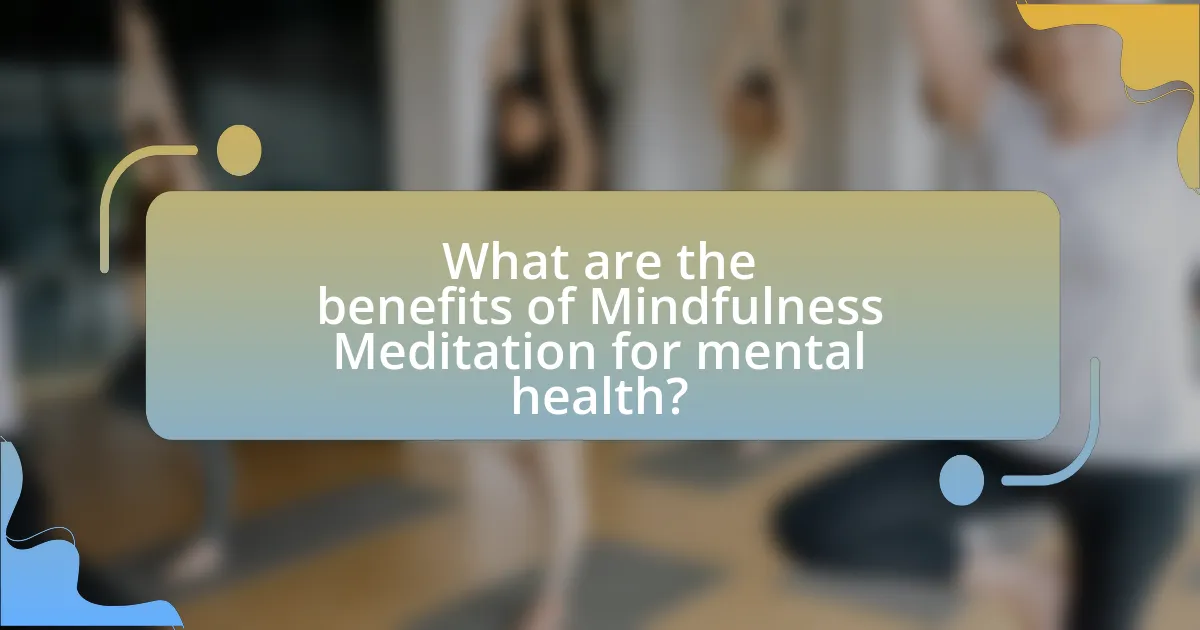
What are the benefits of Mindfulness Meditation for mental health?
Mindfulness meditation significantly enhances mental health by reducing symptoms of anxiety and depression. Research indicates that regular practice can lead to a decrease in stress levels, as evidenced by a meta-analysis published in JAMA Internal Medicine, which found that mindfulness meditation programs can improve anxiety, depression, and pain. Additionally, mindfulness meditation fosters emotional regulation and resilience, allowing individuals to respond to stressors more effectively. Studies, such as those conducted by the University of Massachusetts, demonstrate that participants in mindfulness programs report improved mood and overall well-being.
How does Mindfulness Meditation reduce stress and anxiety?
Mindfulness meditation reduces stress and anxiety by promoting present-moment awareness and enhancing emotional regulation. This practice encourages individuals to observe their thoughts and feelings without judgment, which can lead to decreased rumination and a reduction in stress responses. Research indicates that mindfulness meditation can lower cortisol levels, a hormone associated with stress, and improve overall psychological well-being. A study published in the journal “Psychosomatic Medicine” found that participants who engaged in mindfulness meditation reported significant reductions in anxiety and stress levels compared to those who did not practice mindfulness.
What scientific studies support the effectiveness of Mindfulness Meditation?
Numerous scientific studies support the effectiveness of Mindfulness Meditation in enhancing mental health. For instance, a meta-analysis conducted by Goyal et al. (2014) published in JAMA Internal Medicine reviewed 47 studies involving over 3,500 participants and found that mindfulness meditation programs significantly improved anxiety, depression, and pain. Additionally, a study by Zeidan et al. (2010) in the journal Consciousness and Cognition demonstrated that just four sessions of mindfulness meditation improved attention and cognitive flexibility. These studies provide robust evidence that mindfulness meditation can be a valuable tool for mental health improvement.
How can Mindfulness Meditation improve emotional regulation?
Mindfulness meditation improves emotional regulation by enhancing awareness of thoughts and feelings, allowing individuals to respond to emotions more effectively rather than react impulsively. Research indicates that mindfulness practices can lead to structural changes in the brain, particularly in areas associated with emotional processing, such as the prefrontal cortex and amygdala. A study published in the journal “Psychological Science” by Zeidan et al. (2010) found that participants who engaged in mindfulness meditation showed a significant reduction in emotional reactivity and an increase in emotional regulation capabilities compared to those who did not meditate. This evidence supports the assertion that mindfulness meditation fosters a greater capacity for managing emotions, leading to improved mental health outcomes.
What specific techniques are used in Mindfulness Meditation?
Mindfulness meditation employs specific techniques such as focused attention, body scan, and mindful breathing. Focused attention involves concentrating on a single object, thought, or sensation to enhance awareness and reduce distractions. The body scan technique encourages practitioners to mentally scan their bodies for tension or discomfort, promoting relaxation and awareness of physical sensations. Mindful breathing emphasizes awareness of the breath, guiding individuals to observe their inhalations and exhalations without judgment. These techniques are supported by research indicating that mindfulness meditation can reduce stress and improve mental well-being, as evidenced by studies published in journals like “Psychological Science” and “JAMA Internal Medicine.”
How can breathing exercises enhance Mindfulness Meditation practice?
Breathing exercises can enhance Mindfulness Meditation practice by promoting relaxation and focus, which are essential for effective meditation. When individuals engage in controlled breathing, it activates the parasympathetic nervous system, reducing stress and anxiety levels. Research indicates that deep, rhythmic breathing can lower cortisol levels, a hormone associated with stress, thereby creating a more conducive mental state for mindfulness. Furthermore, focusing on the breath during meditation helps practitioners anchor their attention, making it easier to return to the present moment and cultivate awareness. This combination of physiological and psychological benefits underscores the importance of integrating breathing exercises into mindfulness practices for improved mental health outcomes.
What role does body awareness play in Mindfulness Meditation?
Body awareness is essential in mindfulness meditation as it enhances the practitioner’s ability to focus on the present moment and cultivate a deeper connection with their physical sensations. This heightened awareness allows individuals to observe their thoughts and feelings without judgment, facilitating emotional regulation and reducing stress. Research indicates that body awareness practices, such as the body scan technique, significantly improve mindfulness skills and overall mental well-being, as evidenced by studies like those conducted by Kabat-Zinn, which demonstrate that participants experience reduced anxiety and increased emotional resilience through enhanced body awareness during meditation.
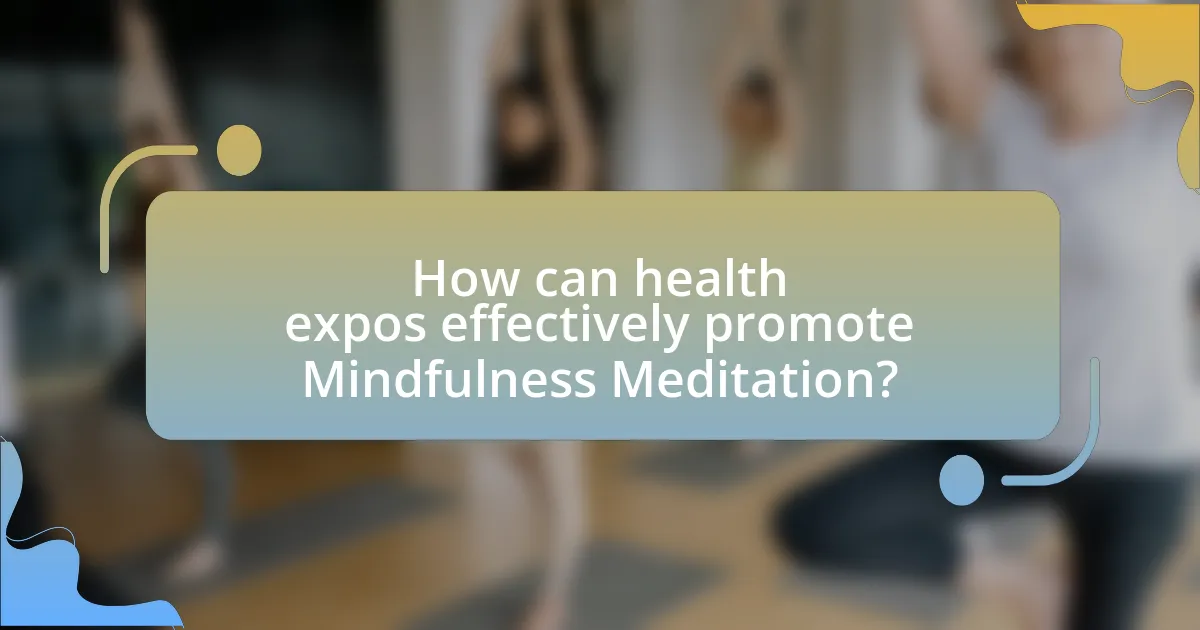
How can health expos effectively promote Mindfulness Meditation?
Health expos can effectively promote Mindfulness Meditation by incorporating interactive workshops, expert-led sessions, and informational booths that engage attendees. These activities allow participants to experience mindfulness practices firsthand, which can enhance understanding and interest. Research indicates that experiential learning significantly increases retention and application of new skills, making workshops particularly effective. Additionally, providing resources such as pamphlets and guided meditation recordings can reinforce the benefits of mindfulness, supported by studies showing that regular practice can reduce stress and improve mental well-being.
What strategies can be employed to engage attendees in Mindfulness Meditation?
To engage attendees in Mindfulness Meditation, interactive sessions that incorporate guided practices and real-time feedback are effective strategies. These sessions can include short, focused meditation exercises that allow participants to experience mindfulness firsthand, fostering immediate engagement. Research indicates that experiential learning enhances retention and interest; for instance, a study published in the Journal of Health Psychology found that participants who engaged in active meditation practices reported higher levels of satisfaction and commitment to mindfulness techniques. Additionally, providing resources such as handouts or access to mobile apps can support ongoing practice, further increasing attendee involvement.
How can workshops and demonstrations enhance understanding of Mindfulness Meditation?
Workshops and demonstrations enhance understanding of Mindfulness Meditation by providing experiential learning opportunities that engage participants directly. These interactive sessions allow individuals to practice techniques in real-time, facilitating deeper comprehension of concepts such as breath awareness and present-moment focus. Research indicates that experiential learning can significantly improve retention and application of mindfulness practices, as evidenced by a study published in the Journal of Clinical Psychology, which found that participants in hands-on workshops reported a 30% increase in mindfulness skills compared to those who only received theoretical instruction. This practical engagement not only clarifies the principles of mindfulness but also fosters a supportive community, encouraging ongoing practice and exploration.
What resources can be provided to support ongoing Mindfulness Meditation practice?
Resources that can support ongoing Mindfulness Meditation practice include guided meditation apps, online courses, and community groups. Guided meditation apps like Headspace and Calm offer structured programs and daily reminders, which help users maintain consistency in their practice. Online courses, such as those provided by platforms like Coursera or Udemy, offer in-depth training and techniques for mindfulness. Additionally, community groups, whether local or online, provide social support and accountability, enhancing the meditation experience through shared practices and discussions. These resources are validated by numerous studies indicating that consistent practice leads to improved mental health outcomes, such as reduced anxiety and increased emotional regulation.
What are some best practices for incorporating Mindfulness Meditation into daily life?
To incorporate Mindfulness Meditation into daily life, individuals should establish a consistent practice by setting aside dedicated time each day, even if it’s just a few minutes. Research indicates that regular practice can enhance emotional regulation and reduce stress, as shown in a study published in the journal Psychological Science, which found that participants who practiced mindfulness reported lower levels of anxiety and improved focus. Additionally, integrating mindfulness into routine activities, such as eating or walking, can help reinforce the practice throughout the day. Engaging in guided meditations through apps or online resources can also provide structure and support for beginners, making it easier to maintain the habit.
How can individuals create a conducive environment for Mindfulness Meditation?
Individuals can create a conducive environment for Mindfulness Meditation by ensuring a quiet, comfortable space free from distractions. This includes selecting a location with minimal noise, using comfortable seating or cushions, and maintaining a suitable temperature. Research indicates that a serene environment enhances focus and relaxation, which are essential for effective meditation practice. Additionally, incorporating elements such as soft lighting, calming scents like lavender, and natural elements can further promote a peaceful atmosphere, supporting the overall mindfulness experience.
What tips can help beginners start their Mindfulness Meditation journey?
To start a Mindfulness Meditation journey, beginners should begin with short, focused sessions of 5 to 10 minutes daily. This approach allows individuals to gradually acclimate to the practice without feeling overwhelmed. Research indicates that even brief periods of mindfulness can reduce stress and improve emotional regulation, as shown in a study published in the journal “Psychological Science” by Zeidan et al. (2010), which found that just 10 minutes of mindfulness meditation can enhance attention and cognitive flexibility. Additionally, beginners should find a quiet space free from distractions, which helps in maintaining focus and enhancing the meditation experience. Regular practice, even in small increments, fosters consistency and builds a solid foundation for deeper mindfulness techniques over time.
